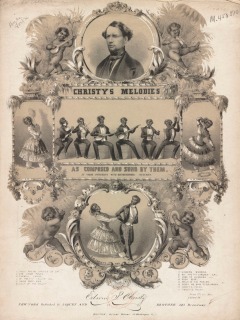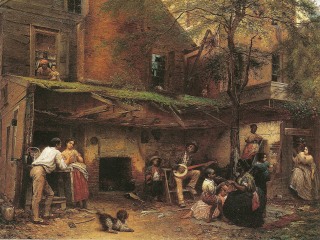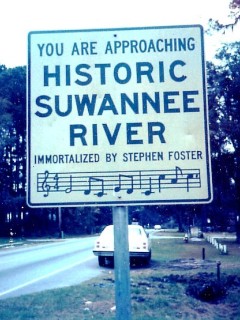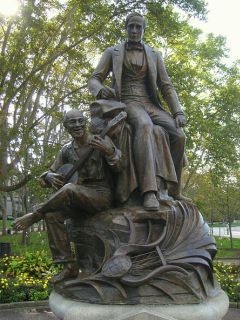

The 150th anniversary of his death calls for a reminiscence: Stephen Foster, America's first great songwriter!
ANGELINA BAKER Angeline the baker lives in our village green The way I always loved her beats all you ever seen Angeline the baker, her age is forty-three I bought her candy by the peck, and she won't marry me Her father is the miller, they call him Uncle Sam I never will forget her, unless I take a dram Angeline is handsome, Angeline is tall They say she sprained her ankle a-dancing at the ball She can't do hard work because she is not stout She bakes her biscuits every day, and pours the coffee out I'll never marry no other girl, no matter where I go I said I'd marry Angeline just twenty years ago The last time I saw her was at the county fair Her father run me almost home and told me to stay thereListen to Angelina Baker from: Barcelona Bluegrass Band, The Unwanted
Watch Angelina Baker from: The Oldtime Stringband, The Unwanted CAMPTOWN RACES De Camptown ladies sing dis song -- Doo-dah doo-dah De Camptown racetrack five miles long -- Oh doo-dah day I come down dah wid my hat caved in -- Doo-dah doo-dah I go back home wid a pocket full of tin -- Oh doo-dah day Gwine to run all night! Gwine to run all day I'll bet my money on de bob-tail nag Somebody bet on de bay De long tail filly and de big black hoss Dey fly de track and dey both cut across De blind hoss sticken in a big mud hole Can't touch bottom wid a ten foot pole Old muley cow come on to de track De bob-tail fling her ober his back Den fly along like a rail-road car Runnin' a race with a shootin' star Seen dem flyin' on a ten mile heat Round de race track, den repeat I win my money on de bob-tail nag I keep my money in an old tow-bag
Listen to Camptown Races from: Last Orders, Ulster Scots Folk Orchestra
Watch Camptown Races from: Johnny Cash, Al Jolson HARD TIMES COME AGAIN NO MORE Let us pause in life's pleasures and count its many tears While we all sup sorrow with the poor There's a song that will linger forever in our ears Oh hard times come again no more Tis the song, the sigh of the weary Hard Times, hard times, come again no more Many days you have lingered around my cabin door Oh hard times come again no more While we seek mirth and beauty and music light and gay There are frail forms fainting at the door Though their voices are silent, their pleading looks will say Oh hard times come again no more There's a pale drooping maiden who toils her life away With a worn heart whose better days are o'er Though her voice would be merry, 'tis sighing all the day Oh hard times come again no more Tis a sigh that is wafted across the troubled wave Tis a wail that is heard upon the shore Tis a dirge that is murmured around the lowly grave Oh hard times come again no more
Listen to Hard Times from: Ronnie Drew & Eleanor Shanley, Rig the Jig
Watch Hard Times from: Emmylou Harris, De Danann, Kate & Anna McGarrigle MY OLD KENTUCKY HOME The sun shines bright in the old Kentucky home 'Tis summer, the darkies are gay The corn-top's ripe and the meadow's in the bloom While the birds make music all the day The young folks roll on the little cabin floor All merry, all happy and bright By 'n' by Hard Times comes a-knocking at the door Then my old Kentucky home, goodnight Weep no more my lady Oh! weep no more today We will sing one song for the old Kentucky home For the Old Kentucky Home far away They hunt no more for the possum and the coon On meadow, the hill and the shore They sing no more by the glimmer of the moon On the bench by the old cabin door The day goes by like a shadow o'er the heart With sorrow, where all was delight The time has come when the darkies have to part Then my old Kentucky home, goodnight The head must bow and the back will have to bend Wherever the darky may go A few more days, and the trouble all will end In the field where the sugar-canes grow A few more days for to tote the weary load No matter, 'twill never be light A few more days till we totter on the road Then my old Kentucky home, goodnight
Watch My Old Kentucky Home from: Red Wine, Crystal Gayle OH! SUSANNA I come from Alabama with my Banjo on my knee I’se gwine to Lou’siana my true lub for to see It rain’d all night de day I left, de wedder it was dry The sun so hot I froze to def—Susanna, dont you cry Oh! Susanna, do not cry for me I come from Alabama, wid my Banjo on my knee I jump’d aboard the telegraph and trabbeled down de ribber De lectrie fluid magnified, and kill’d five hundred Nigger De bullgine bust, de hoss ran off, I really thought I’d die I shut my eyes to hold my bref—Susanna, dont you cry I had a dream de udder night, when ebry ting was still I thought I saw Susanna dear, a coming down de hill De buckweat cake was in her mouf, de tear was in her eye I says, I’se coming from de souf, -- Susanna, dont you cry
Listen to Oh! Susanna from: Éamonn Coyne, Pete Seeger, Ulster Scots Folk Orchestra, Damaris Woods
Watch Oh! Susanna from: John McEuen, Trapp Family, Al Jolson, James Taylor OLD FOLKS AT HOME Way down upon de Swanee Ribber, far, far away Dere's wha my heart is turning ebber Dere's wha de old folks stay All up and down de whole creation sadly I roam Still longing for de old plantation And for de old folks at home All de world am sad and dreary Ebrywhere I roam Oh, darkeys, how my heart grows weary Far from de old folks at home All round de little farm I wandered when I was young Den many happy days I squandered Many de songs I sung When I was playing wid my brudder, happy was I Oh, take me to my kind old mudder Dere let me live and die One little hut among de bushes, one dat I love Still sadly to my memory rushes No matter where I rove When will I see de bees a-humming all round de comb? When will I hear de banjo strumming, Down in my good old home?
Listen to Old Folks At Home from: Ulster Scots Folk Orchestra
Watch Old Folks At Home from: Pete Seeger, Stephen Griffith, Bing Crosby
Stephen Collins Foster (July 4, 1826 – January 13, 1864), known as the "father of American music", was an American songwriter primarily known for his parlour and minstrel music. Foster wrote over 200 songs; among his best known are "Oh! Susanna," "Camptown Races," "Old Folks at Home," "My Old Kentucky Home," "Jeanie with the Light Brown Hair," "Old Black Joe," and "Beautiful Dreamer." Many of his compositions remain popular more than 150 years after he wrote them.
Foster attended private academies in Allegheny, Athens and Towanda, Pennsylvania. He received an education in English grammar, diction, the classics, penmanship, Latin and Greek, and mathematics. In 1839, his elder brother William was serving his apprenticeship as an engineer at nearby Towanda and thought Stephen would benefit from being under his supervision. The site of the Camptown Races is 30 miles from Athens, and 15 miles from Towanda. Stephen attended Athens Academy from 1839 to 1841. He wrote his first composition, Tioga Waltz, while attending Athens Academy, and performed it during the 1841 commencement exercises; he was 14. It was not published during the composer's lifetime, but it is included in the collection of published works by Morrison Foster. In 1842, Athens Academy was destroyed in a fire.
His education included a brief period at Jefferson College in Canonsburg, Pennsylvania (now Washington & Jefferson College). His tuition was paid, but Foster had little spending money. Sources conflict on whether he left willingly or was dismissed; but, either way, he left Canonsburg to visit Pittsburgh with another student and didn't return.
During his teenage years, Foster was influenced greatly by two men. Henry Kleber (1816–1897), one of Stephen’s few formal music instructors, was a classically trained musician who emigrated from Darmstadt, Germany, to Pittsburgh and opened a music store. Dan Rice was an entertainer, a clown and blackface singer, making his living in traveling circuses. Although respectful of the more civilized parlor songs of the day, he and his friends would often sit at a piano, writing and singing minstrel songs through the night. Eventually, Foster learned to blend the two genres to write some of his best-known work.
In 1846, Foster moved to Cincinnati, Ohio, and became a bookkeeper with his brother's steamship company. While in Cincinnati, Foster penned his first successful songs—among them "Oh! Susanna," which became an anthem of the California Gold Rush—in 1848–1849. In 1849, he published Foster's Ethiopian Melodies, which included the successful song "Nelly Was a Lady", made famous by the Christy Minstrels. A plaque marks the site of Foster's residence in Cincinnati, where the Guilford School building is now located.

Then he returned to Pennsylvania and signed a contract with the Christy Minstrels. It was during this period that Foster would write most of his best-known songs: "Camptown Races" (1850), "Nelly Bly" (1850), "Old Folks at Home" (known also as Swanee River, 1851), "My Old Kentucky Home" (1853), "Old Dog Tray" (1853), and "Jeanie With the Light Brown Hair" (1854), written for his wife Jane Denny McDowell.
Many of Foster's songs were of the blackface minstrel show tradition popular at the time. Foster sought, in his own words, to, "...build up taste ... among refined people by making words suitable to their taste, instead of the trashy and really offensive words which belong to some songs of that order." Many of his songs had Southern themes, yet Foster never lived in the South and visited it only once in 1852 by river-boat voyage on his honeymoon on his brother Dunning's steam boat the Millinger, which took him down the Mississippi to New Orleans.
Foster attempted to make a living as a professional songwriter and may be considered innovative in this respect, since this field did not yet exist in the modern sense. Due in part to the limited scope of music copyright and composer royalties at the time, Foster realized very little of the profits his works generated for sheet music printers. Multiple publishers often printed their own competing editions of Foster's tunes, paying Foster nothing. He received $100 ($2,653 in 2012 dollars) for Oh, Susanna.
Foster moved to New York City in 1860. About a year later, his wife and daughter left him and returned to Pittsburgh. Beginning in 1862, his fortunes decreased, and as they did, so did the quality of his new songs. Early in 1863, he began working with George Cooper, whose lyrics were often humorous and designed to appeal to musical theater audiences. The Civil War created a flurry of newly written music with patriotic war themes, but this did not benefit Foster. During this time he composed a series of Sunday School hymns, including "Give Us This Day" (1863).
Foster had become impoverished while living at the North American Hotel at 30 Bowery on the Lower East Side of Manhattan, New York. He was reportedly confined to his bed for days by a persistent fever; Foster tried to call a chambermaid, but collapsed, falling against the washbasin next to his bed and shattering it, which gouged his head. It took three hours to get him to Bellevue Hospital. In an era before transfusions and antibiotics, he succumbed three days after his admittance, aged 37.

His worn leather wallet contained a scrap of paper that simply said, "Dear friends and gentle hearts," along with 38 cents in Civil War scrip and three pennies. Foster was buried in the Allegheny Cemetery in Pittsburgh. One of his most beloved works, "Beautiful Dreamer," was published shortly after his death.
Foster is acknowledged as "father of American music." He was inducted into the Songwriters Hall of Fame in 1970, and he was also inducted into the Nashville Songwriters Hall of Fame in 2010.
"My Old Kentucky Home" is the official state song of Kentucky, adopted by the General Assembly on March 19, 1928. "Old Folks at Home" is the official state song of Florida, designated in 1935. Because of the racial lyrics, it was modified with approval from the Stephen Foster Memorial. After a lengthy debate, the modified song was kept as the official state song, while Florida (Where the Sawgrass Meets the Sky) was added as the state anthem.
American baritone Nelson Eddy recorded 35 Foster songs over three recording sessions in July, August and September 1947 on Columbia Records, in 78 format, 2 songs per record. Columbia issued these recordings in 1948 as "Nelson Eddy in Songs of Stephen Foster (Volume 1: A-745 and Volume 2: A-795)". In 2005 Jasmine Records compiled all 35 Foster songs in one CD, "Nelson Eddy Sings The Stephen Foster Songbook", JASCD 421. "In these performances, arranger/conducter Robert Armbruster made every attempt to frame Nelson Eddy's voice with a simple, yet colorful, orchestral and choral background - the norm of Stephen Foster's time." (Liner notes by Robert Nickora July 2005).
American classical composer Charles Ives freely quoted a wide variety of Foster's songs in many of his own works.

Douglas Jimerson, a tenor from Baltimore who has released CDs of music from the Civil War era, released Stephen Foster's America in 1998. Just before his death in 2004, singer-songwriter Randy Vanwarmer completed an entire album of Stephen Foster songs. It was released posthumously as Sings Stephen Foster.
Eighteen of Foster's compositions were recorded and released on the Beautiful Dreamer: The Songs of Stephen Foster collection. Among the artists who are featured on the album are John Prine, Ron Sexsmith, Alison Krauss, Yo Yo Ma, Roger McGuinn, Mavis Staples, and Suzy Bogguss. The album won the Grammy for Best Traditional Folk Album in 2005.
Singer/songwriter Syd Straw covered "Hard Times Come Again No More" on her 1989 album "Surprise." The same song (as "Hard Times") appears on Bob Dylan's 1992 album Good as I Been to You.
In 2012, performer and educator Jonathan Guyot Smith, who taught a college course devoted exclusively to the study of Foster's music, released a CD of Foster songs, Stephen Foster Melodies and Serenades for the American Parlor, which contains several seldom-heard Foster songs. The performances are in the style of a 19th-century parlor performance rather than in the manner of a formal concert.
A Squirrel Nut Zippers song titled "The Ghost of Stephen Foster" features references to his most famous works, including "Camptown Races".
Three Hollywood movies have been made of Foster's life: Harmony Lane (1935) with Douglass Montgomery, Swanee River (1939) with Don Ameche, and I Dream of Jeanie (1952), with Bill Shirley. The 1939 production was one of Twentieth Century Fox's more ambitious efforts, filmed in Technicolor; the other two were low-budget affairs made by B-movie studios.


Text is available under the Creative Commons Attribution-ShareAlike License.
Date: February 2014.
Photo Credits:
(1) Stephen Foster;
(2) Christy Minstrels: Camptown Races;
(3) Eastman Johnson: Negro Life at the South (popularly known as Old Kentucky Home), 1859;
(4) Suwannee River;
(5) Cinzi Lavin & Jennifer Love: Dreamer – The Music of Stephen Foster;
(6) Sculpture by Giuseppe Moretti (unknown).